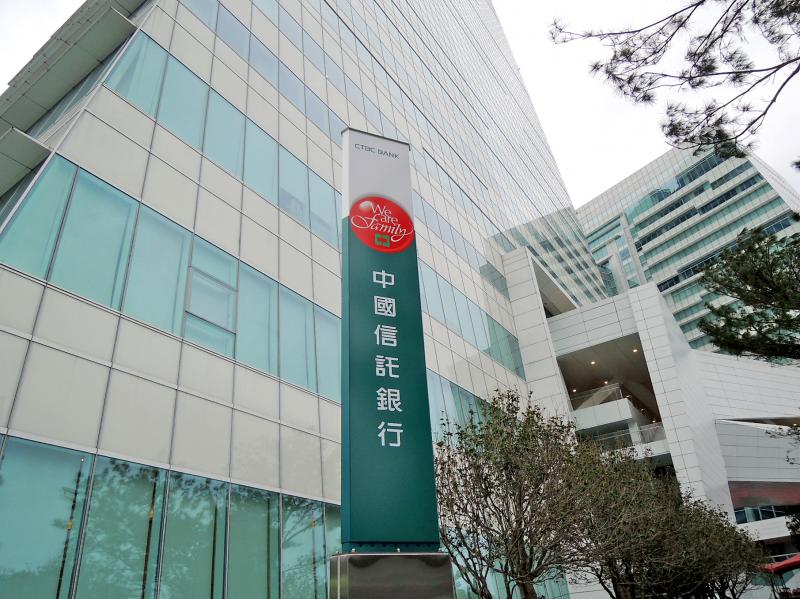Biodiversity loss is one of the top three risks in the next 10 years and would seriously affect future generations’ access to essential resources, the World Economic Forum said in The Global Risks Report 2022 last month.
For a long time, CTBC Financial Holding Co (中信金控) has focused on promoting the positive influence of the UN’s Sustainable Development Goals (SDGs).
As four of the 17 are closely related to nature (SDG 6, SDG 13, SDG 14 and SDG 15), and protecting and supporting biodiversity is the foundation of realizing a sustainable society, CTBC Financial on Monday last week became the first Taiwanese company to join the Taskforce on Nature-related Financial Disclosure (TNFD), aiming to work with more than 250 members around the world to contribute cross-disciplinary expertise and experience, and to develop a reporting framework.

Photo: Lee Chin-hui, Taipei Times
The TNFD was in June last year launched by an informal working group comprising 75 members, including the UN Environment Programme Finance Initiative, the UN Development Programme, the WWF, Global Canopy, Citi Group Inc, AXA SA, BNP Paribas SA, and other financial institutions, governments, think tanks and corporations.
Taking a cue from the successful experience of the Task Force on Climate-related Financial Disclosures (TCFD), the TNFD’s mission is to develop a disclosure framework for companies to report and act on nature-related risks, thereby supporting global capital markets to create positive value for nature.
CTBC Financial signed on to the TCFD in 2020, using the initiative’s framework to assess climate risk management and governance, as well as to promote low-carbon transformation in Taiwan and the Asia-Pacific region.
The company expects to reach a wider range of natural and ecological issues through participation in the TNFD.
In accordance with the TNFD, the company aims to strengthen the disclosure of nature-related risks and countermeasures from five aspects: governance, strategy, risk management, metrics and targets.
In addition, CTBC Financial is to continue to discuss with customers and encourage them to take positive actions to prevent related businesses from having a negative impact on the natural environment and fulfill corporate responsibilities of protecting the natural ecology.

Taiwan will prioritize the development of silicon photonics by taking advantage of its strength in the semiconductor industry to build another shield to protect the local economy, National Development Council (NDC) Minister Paul Liu (劉鏡清) said yesterday. Speaking at a meeting of the legislature’s Economics Committee, Liu said Taiwan already has the artificial intelligence (AI) industry as a shield, after the semiconductor industry, to safeguard the country, and is looking at new unique fields to build more economic shields. While Taiwan will further strengthen its existing shields, over the longer term, the country is determined to focus on such potential segments as

UNCERTAINTY: Innolux activated a stringent supply chain management mechanism, as it did during the COVID-19 pandemic, to ensure optimal inventory levels for customers Flat-panel display makers AUO Corp (友達) and Innolux Corp (群創) yesterday said that about 12 to 20 percent of their display business is at risk of potential US tariffs and that they would relocate production or shipment destinations to mitigate the levies’ effects. US tariffs would have a direct impact of US$200 million on AUO’s revenue, company chairman Paul Peng (彭雙浪) told reporters on the sidelines of the Touch Taiwan trade show in Taipei yesterday. That would make up about 12 percent of the company’s overall revenue. To cope with the tariff uncertainty, AUO plans to allocate its production to manufacturing facilities in

COLLABORATION: Given Taiwan’s key position in global supply chains, the US firm is discussing strategies with local partners and clients to deal with global uncertainties Advanced Micro Devices Inc (AMD) yesterday said it is meeting with local ecosystem partners, including Taiwan Semiconductor Manufacturing Co (TSMC, 台積電), to discuss strategies, including long-term manufacturing, to navigate uncertainties such as US tariffs, as Taiwan occupies an important position in global supply chains. AMD chief executive officer Lisa Su (蘇姿丰) told reporters that Taiwan is an important part of the chip designer’s ecosystem and she is discussing with partners and customers in Taiwan to forge strong collaborations on different areas during this critical period. AMD has just become the first artificial-intelligence (AI) server chip customer of TSMC to utilize its advanced

While China’s leaders use their economic and political might to fight US President Donald Trump’s trade war “to the end,” its army of social media soldiers are embarking on a more humorous campaign online. Trump’s tariff blitz has seen Washington and Beijing impose eye-watering duties on imports from the other, fanning a standoff between the economic superpowers that has sparked global recession fears and sent markets into a tailspin. Trump says his policy is a response to years of being “ripped off” by other countries and aims to bring manufacturing to the US, forcing companies to employ US workers. However, China’s online warriors